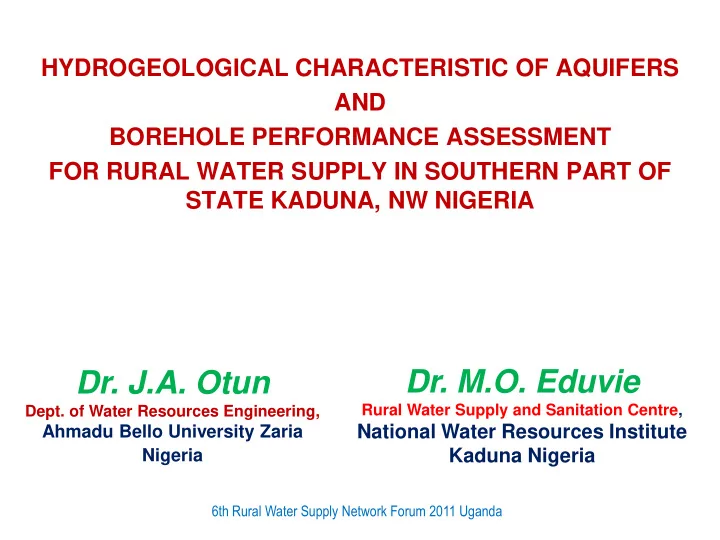

HYDROGEOLOGICAL CHARACTERISTIC OF AQUIFERS AND BOREHOLE PERFORMANCE ASSESSMENT FOR RURAL WATER SUPPLY IN SOUTHERN PART OF STATE KADUNA, NW NIGERIA Dr. M.O. Eduvie Dr. J.A. Otun Rural Water Supply and Sanitation Centre, Dept. of Water Resources Engineering, National Water Resources Institute Ahmadu Bello University Zaria Nigeria Kaduna Nigeria 6th Rural Water Supply Network Forum 2011 Uganda
Introduction • The importance of groundwater as a water supply source to the socioeconomic development of any nation is tremendous – GW is the only viable source of water in many remote villages where development of surface water is not economically viable. • Some difficulties experienced in its exploration and exploitation in the basement areas where aquifers are both isolated and compartmentalized • Exploration programme now requires the use of multi-disciplinary approach involving, geological and hydro-geological mapping, geophysical investigations. 6th Rural Water Supply Network Forum 2011 Uganda
Study Approach • Conceptually, locating productive boreholes in areas with inadequate hydrogeological information is usually difficult and very tasking. • A multidisciplinary approach was used to study and characterize the aquifer parameters and evaluate the groundwater potentials of the crystalline basement of the study area in Kaduna State. 6th Rural Water Supply Network Forum 2011 Uganda
Multi-Disciplinary Approach • Preliminary hydrogeological assessment: – Used to describe and understand the salient hydrogeological features of its dominant rock types • Hydrological review – as it affects the groundwater availability, – in addition to surface geophysical surveys (using the electromagnetic (EM) and resistivity techniques) , well water level measurements, borehole drilling and pumping tests and water quality analysis that were carried out. • Spatial Mapping and Interpretations: Mapping of obtained superimposed data to produce several hydro- geological maps that are best considered to be valuable for interpretation and management of the entire ground water resources of the study area. 6th Rural Water Supply Network Forum 2011 Uganda
Assessment of Hydrogeological Characteristics: • Geological and Hydrogeological Mapping : Set of hydrogroundwater configuration maps were constructed by the superimposition method and the corresponding hydrogeological cross section drawn. • Geophysical survey : Electromagnetic (EM) method used for some traversing, the resistivity method using Wenner array was also employed. – Vertical electrical soundings were conducted in promising zones identified after profiling 6th Rural Water Supply Network Forum 2011 Uganda
Geological and structural map of the study area 6th Rural Water Supply Network Forum 2011 Uganda
Groundwater Configuration Map of the study area 6th Rural Water Supply Network Forum 2011 Uganda
Hydrological cross section of NE-SW line 6th Rural Water Supply Network Forum 2011 Uganda
Geophysical Investigations: Typical EM responses in the study area 6th Rural Water Supply Network Forum 2011 Uganda
Findings • Two geophysical survey techniques employed proved effective in determining the regolith aquifers in terms of thickness of water saturated zone with subsurface layering ranging from 3-5 layers. • Characterization of borehole parameters within the study area : – Borehole yields ( 7.2-302.4 m 3 /day) , – Aquifer transmissivity ( 0.359-101 m 2 /day) and – Hydraulic conductivity (0.03 -10.9m/day) • Obtained database helped in constructing hydro- geological maps 6th Rural Water Supply Network Forum 2011 Uganda
Conclusions • The study through its multi-disciplinary approach showed the high groundwater potentials of the basement complex area of Southern parts of Kaduna State of Nigeria. • It derives quantum of hydrogeological information databases which were non- available before the study: – Preparation of hydrogeological maps – Borehole logging database, – Water quality analysis and database, – Well reviews and pre-drilling geophysical investigations; 6th Rural Water Supply Network Forum 2011 Uganda
Conclusions • With the quantum of hydrogeological information databases derived from several multi-disciplinary analysis carried out the entire groundwater resources in the study area is certainly poised and optimised for effective rural water supply; • Understanding these hydrogeological characteristics of the weathered/fractured aquifers in this study area is essential for sound borehole design, construction and management. • , 6th Rural Water Supply Network Forum 2011 Uganda
Recommend
More recommend